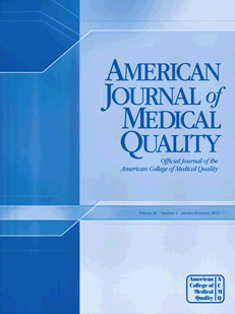
AMERICAN JOURNAL OF MEDICAL QUALITY
Scope & Guideline
Driving Innovation in Healthcare Delivery and Policy
Introduction
Aims and Scopes
- Quality Improvement Methodologies:
The journal publishes studies that apply various quality improvement methodologies, such as Plan-Do-Study-Act (PDSA), Lean, and Six Sigma, to enhance healthcare delivery and patient outcomes. - Patient Safety and Risk Management:
A significant focus is placed on research related to patient safety, including studies that assess adverse events, safety culture, and the implementation of safety protocols in healthcare settings. - Health Systems Science Integration:
The journal emphasizes the incorporation of health systems science into clinical practice, highlighting the importance of understanding healthcare systems, policies, and their impact on patient care. - Interdisciplinary Collaboration:
Research that showcases interdisciplinary approaches to healthcare challenges is prioritized, reflecting the need for collaboration among healthcare professionals to improve quality and safety. - Patient-Centered Care:
The journal promotes studies that focus on patient-centered care models, including the assessment of patient experiences, satisfaction, and engagement in their healthcare journey. - Innovative Healthcare Technologies:
There is a growing interest in the application of digital health technologies, telemedicine, and electronic health records to enhance care quality and efficiency.
Trending and Emerging
- Post-COVID-19 Care Models:
There is an increasing focus on research related to post-acute care models, particularly for COVID-19 survivors, highlighting the need for specialized care to address long-term health effects. - Integration of Social Determinants of Health:
Emerging studies are increasingly addressing the integration of social determinants of health into healthcare quality assessments, recognizing their critical role in patient outcomes. - Digital Health Innovations:
Research on digital health technologies, including telemedicine and remote monitoring, is trending as healthcare systems adapt to new care delivery models post-pandemic. - Workforce Wellness and Burnout Prevention:
There is a growing emphasis on understanding and improving healthcare workforce wellness and burnout, reflecting the impact of the pandemic on healthcare providers. - Patient Engagement Strategies:
An increasing number of studies are focusing on innovative strategies to engage patients in their care processes, recognizing the importance of patient involvement in improving health outcomes.
Declining or Waning
- Traditional Clinical Protocols:
Research focusing solely on traditional clinical protocols without integration of quality improvement strategies seems to be less prevalent, as the field moves towards more dynamic, adaptive approaches to care. - Single-Disciplinary Approaches:
There is a noticeable decrease in studies that rely on single-disciplinary perspectives, as interdisciplinary collaboration has become a central theme in healthcare quality improvement. - Static Quality Metrics:
The use of static quality metrics without consideration for real-time data and adaptive management strategies is declining, as there is a growing recognition of the need for more responsive quality measures. - Focus on Isolated Patient Outcomes:
Studies that concentrate solely on isolated patient outcomes without considering broader health system impacts are becoming less common, reflecting a shift towards a more holistic view of healthcare quality. - Regulatory Compliance as a Primary Focus:
Research that primarily addresses regulatory compliance without a focus on quality improvement outcomes is diminishing, as the emphasis shifts toward enhancing patient care and safety outcomes.
Similar Journals
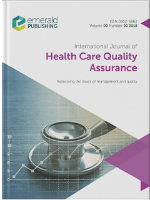
INTERNATIONAL JOURNAL OF HEALTH CARE QUALITY ASSURANCE
Transforming Health Care Through Quality AssuranceINTERNATIONAL JOURNAL OF HEALTH CARE QUALITY ASSURANCE is a leading academic journal published by Emerald Group Publishing Ltd, dedicated to advancing the fields of health care quality and health policy. Established in 1988, this esteemed journal addresses critical issues in health care management, offering insights into best practices and innovative strategies to enhance quality assurance in diverse health care settings. With an impact factor that places it in the Q3 tier across both health policy and business management categories, the journal serves as a valuable resource for researchers, practitioners, and students seeking to contribute to the conversation on health care quality improvement. Although currently not an Open Access journal, it remains accessible through various academic databases, facilitating a wide reach of its scholarly contributions. The journal's mission is to foster interdisciplinary dialogue and share evidence-based research that can inform policies and practices aimed at improving health care delivery globally.
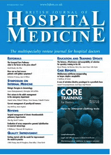
BRITISH JOURNAL OF HOSPITAL MEDICINE
Exploring the forefront of hospital medicine since 1996.BRITISH JOURNAL OF HOSPITAL MEDICINE is a distinguished publication in the field of medicine, focusing primarily on the latest research, clinical practices, and advancements in hospital medicine. Published by MA HEALTHCARE LTD in the United Kingdom, this journal serves as a critical resource for healthcare professionals, researchers, and students alike, featuring insightful articles that bridge the gap between theory and practice. Holding a Q3 ranking in the miscellaneous medicine category and positioned within the top half of Scopus rankings, the journal underscores its commitment to high-quality, peer-reviewed content. With its inception dating back to 1996, the BRITISH JOURNAL OF HOSPITAL MEDICINE has evolved to include a broad spectrum of topics relevant to contemporary hospital settings, ensuring its readers are well-equipped with the knowledge necessary for improving patient care. Access options are tailored to modern readership, enhancing the visibility and dissemination of vital medical research.
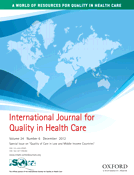
INTERNATIONAL JOURNAL FOR QUALITY IN HEALTH CARE
Empowering policymakers with pivotal healthcare research.INTERNATIONAL JOURNAL FOR QUALITY IN HEALTH CARE, published by Oxford University Press, stands as a pivotal resource in the domains of Health Policy, Medicine, and Public Health. With an ISSN of 1353-4505 and an E-ISSN of 1464-3677, this journal has been a cornerstone for quality assessment in healthcare since its inception in 1989, evolving through to 2024. Holding a respected position in the academic community, it is classified in the Q2 category across multiple fields including Health Policy and Environmental Health, reflecting its significant impact as evidenced by its Scopus rankings (Rank #74/310 in Health Policy, Percentile 76th). Though it operates under a subscription model, the journal aims to disseminate pioneering research aimed at improving healthcare quality globally, providing insights that are invaluable for researchers, practitioners, and policymakers alike. With a commitment to enhancing public health landscapes, the journal continues to influence practices and outcomes in a rapidly changing health environment.
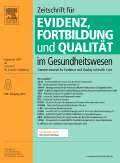
Zeitschrift fur Evidenz Fortbildung und Qualitaet im Gesundheitswesen
Inspiring change through rigorous research and quality standards.Zeitschrift für Evidenz Fortbildung und Qualität im Gesundheitswesen, published by Elsevier GmbH, serves as a pivotal platform for the dissemination of research and innovations within the realms of health policy, medicine, and education. Established in 2008 and continuing its impactful trajectory through 2024, this journal boasts a recognition as a Q2 journal in Education and positions itself within the Q3 tier for both Health Policy and miscellaneous Medicine categories, reflecting its dual focus on scholarly rigor and practical application. Despite not being an Open Access journal, it remains a valued resource for academics and practitioners, evidenced by its rankings: #214 out of 398 in Medicine (miscellaneous) and #829 out of 1543 in Social Sciences (Education) according to Scopus metrics. The journal's commitment to enhancing education and quality in healthcare makes it an essential read for researchers, professionals, and students seeking to stay abreast of the latest evidence-based practices and policies that shape health outcomes worldwide.

Journal of Healthcare Quality Research
Driving innovations for better patient care worldwide.Journal of Healthcare Quality Research is an esteemed publication dedicated to advancing the field of health policy through rigorous research and comprehensive analysis. Published by ELSEVIER ESPANA SLU, this journal serves as a vital platform for researchers, professionals, and academics striving to address critical issues affecting healthcare quality across the globe. As a Q3 ranked journal in health policy for 2023, it holds a significant position within the Scopus rankings, showcasing its role in shaping healthcare discussions and policies. The E-ISSN: 2603-6479 reflects its commitment to wide accessibility, with an objective to provide insightful contributions that bridge gaps between theory and practice. With an impressive scope that spans from 2018 to 2024, the journal not only disseminates high-quality research but also fosters collaboration among policymakers and healthcare providers, driving innovations that enhance patient care and health systems worldwide.

Journal of Renal Care
Advancing renal health through innovative research.The Journal of Renal Care, published by Wiley, stands as a leading scholarly platform for researchers, healthcare professionals, and students dedicated to advancements in nephrology and specialized nursing practices. With an impact factor that reflects its high degree of influence in the field—ranking in the Q1 category for Advanced and Specialized Nursing and Q2 for Nephrology based on 2023 metrics—it serves as an essential resource for innovative research and clinical insights. The journal's ISSN (1755-6678) and E-ISSN (1755-6686) facilitate easy access to cutting-edge studies and reviews that have shaped the scope of renal care since its inception in 2006, with a converged publication span extending until 2024. Addressing the pressing challenges within nephrology, this journal fosters a stimulating academic environment, enhancing the quality of patient care through rigorous peer-reviewed research and dialogue. As it continues to contribute significantly to both nursing and medical disciplines, the Journal of Renal Care remains a pivotal source for nurturing knowledge and advancing practice in renal healthcare.
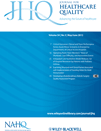
Journal for Healthcare Quality
Shaping the future of healthcare quality and policy.Journal for Healthcare Quality, published by Lippincott Williams & Wilkins, serves as a vital platform for disseminating innovative research and insights in the fields of health policy, public health, and medicine. With an ISSN of 1062-2551 and an E-ISSN of 1945-1474, this esteemed journal has been contributing to the improvement of healthcare practices since its inception in 1992. Positioned in the Q3 quartile across its relevant categories as of 2023, it addresses critical issues affecting healthcare quality and policy, demonstrating its commitment to advancing the field. Although it does not currently offer open access, the journal provides researchers and practitioners with an invaluable resource for enhancing their knowledge and practice through peer-reviewed articles aimed at an audience dedicated to improving health outcomes. Located in Philadelphia, the journal continually strives to bridge the gap between research and practical application, making it a cornerstone for those looking to impact healthcare quality.
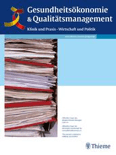
Gesundheitsoekonomie und Qualitaetsmanagement
Fostering Excellence in Health Economics and Quality ManagementGesundheitsoekonomie und Qualitaetsmanagement, published by THIEME MEDICAL PUBL INC, serves as a vital resource in the field of health policy, particularly within the context of Germany. Since its inception in 1999, this journal has been committed to advancing the discourse on health economics and quality management, making significant contributions to understanding the complexities of healthcare systems. With an impact factor that reflects its ongoing importance, the journal is categorized in the Q4 quartile for Health Policy as of 2023, indicating its role in serving a niche yet crucial space in medical literature. Although currently not an open access journal, it remains accessible through various academic platforms, making its content available to a diverse audience of researchers, healthcare professionals, and students eager to engage with contemporary issues in health economics. With its publication continuing through 2024, Gesundheitsoekonomie und Qualitaetsmanagement is essential for anyone looking to deepen their understanding of the economic aspects of healthcare and ensure quality management in health services.
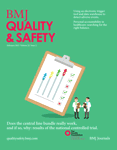
BMJ Quality & Safety
Advancing healthcare through impactful research.BMJ Quality & Safety, published by the BMJ Publishing Group, stands as a beacon in the fields of Health Policy and Medicine, with an impressive impact factor that signifies its leading role in advancing healthcare quality and safety research. The journal, which has been active since 2011, consistently ranks in the Q1 category for both Health Policy and miscellaneous Medicine categories, reinforcing its influence with a Scopus ranking of 16/310, placing it in the 95th percentile. With a commitment to open access, BMJ Quality & Safety enables widespread dissemination of knowledge, making cutting-edge research accessible to a global audience. Its contributions are vital for researchers, healthcare professionals, and students aiming to improve healthcare systems, policies, and practices worldwide. The journal's address in the esteemed British Medical Association House situates it at the heart of medical discourse in the UK, further enhancing its importance in an ever-evolving healthcare landscape.
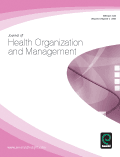
Journal of Health Organization and Management
Elevating the discourse on health organization and management.The Journal of Health Organization and Management, published by Emerald Group Publishing Ltd, serves as a pivotal resource for professionals, researchers, and students interested in the intersection of health policy and organizational effectiveness. With an ISSN of 1477-7266 and an E-ISSN of 1758-7247, this esteemed journal has been charting advancements in health management since 2003, showcasing articles that reflect rigorous research and the latest trends in the field. Hailing from the United Kingdom, the journal has established itself within the upper echelons of academic literature, currently enjoying a Q2 classification in notable categories, including Business, Management, and Accounting, Health Policy, and Organizational Behavior and Human Resource Management, as of 2023. With impressive rankings in Scopus, including a percentile rank in the 62nd for Business and Management, it is an essential platform for disseminating innovative ideas and evidence-based findings crucial for enhancing health care systems globally. While it operates under a conventional access model, the journal remains dedicated to fostering scholarly dialogue and advancing the understanding of health organization complexities.